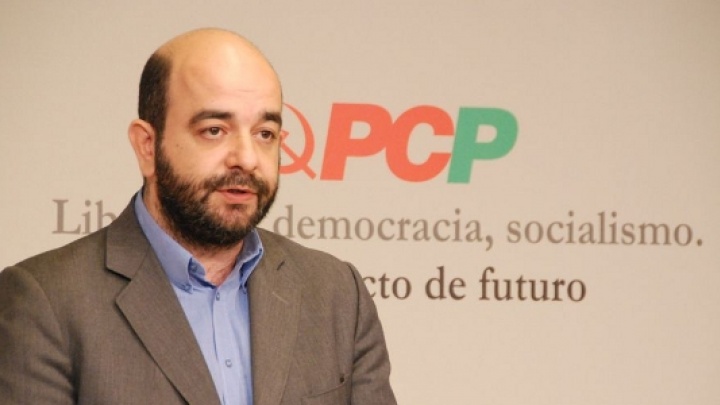Press Conference by Angelo Alves, Member of the PCP Poliitical Committee and Member of the International Department
31 January 2012
1 – The informal meeting of the European Council made no contribution toward solving the very serious economic and social problems that are affecting several European Union countries.
On the contrary, the meeting's conclusions are themselves an additional factor of deterioration. They persevere on a path of social retrogression, economic recession and decline, destruction of productive assets in several European Union countries, more unemployment, greater inequality and more unbalanced growth. That is to say, precisely the same path and the same policies that have led to the current situation.
2 – The adoption of the European Stability Mechanism and of the budget and fiscal pact imposed by the German government – that Portugal's PSD/CDS government signed, in a veritable act of surrender, contrary to the national interest – is a very serious step toward the imposition and institutionalisation of the policies contained in IMF and European Union programmes – whose catastrophic consequences are there for all to see. It is one more stepping stone in a strategy to concentrate and centralise economic and political power on big finance capital and on the European Union's big powers, Germany prominent among them.
3 – The adoption of these two documents constitutes a “full speed ahead” call with respect to capitalism's crisis in Europe, the Economic and Monetary Union's failure, the bursting of contradictions in the European capitalist integration process (very visible in the increasingly real scenario of breakup of the eurozone as currently configured) and also with respect to European governments' growing difficulty in imposing so-called austerity policies upon workers and peoples, amidst their growing opposition and struggle.
This “full speed ahead” policy is dictated in the main by big finance capital's interests. Taking advantage of the current situation, big finance capital has begun a far-reaching ideological offensive to achieve a deep – unprecedented in the post-war period – social and civilisational retrogression, and has launched a criminal onslaught against some of the most elementary democratic principles and respect for States' independence and sovereignty.
“Full speed ahead” is also in itself clear proof of the fact that – in the context of the current European Union – there are no overall responses capable of truly overcoming the deep economic and social crisis. It is one more enlightening fact about the fallacious proclaimed goals of economic and social cohesion.
4 – The budget pact imposed by Germany's government constitutes a veritable declaration of war against peoples' right to economic and social development.
The rules and measures advanced – particularly such irrational ones as the intangible deficit and debt ceilings; the automatic sanctions and the budget correction and supervision mechanism, among others – are an unacceptable straitjacket that, were it to be applied, would subject countries such as Portugal to economic and social underdevelopment and to a march toward a social abyss, economic recession and dependence, thus turning them into veritable 21st century protectorates.
The pact that was signed yesterday worsens some of the hardest-hitting aspects already included in the Lisbon Treaty, and has features of a constitutional coup against sovereign States such as ours. It embodies a thinly-veiled vision of neo-colonial domination in the European Union, one that institutionalises market dictatorship, enshrines neo-liberalism as the official doctrine and dogma, debases national institutions to mere implementors of economic, budgetary and fiscal policies determined by the big powers in the interests of finance capital.
It is a coup that seeks to turn the austerity, dependence and economic decline cycles into permanent features, trapping countries such as Portugal into decline and retrocession, preventing in practice any sovereign development of their productive assets or of their populations' living conditions.
Calling it a “treaty” is therefore an aberration in the light of the most elementary principles of democracy or of the tenets of international law or even of the European Union's very rules and operating procedures. It is therefore a national imperative to fight against its ratification and implementation in Portugal. This is a task for all democrats, and it constitutes dutiful internationalist solidarity with Europe's workers and peoples. The CGTP's [trade union central] upcoming demonstration on 11 February will be a particularly important milestone in this struggle.
5 – The adoption by the European Council members of a declaration on “growth and employment” is essentially a piece of rhetoric dictated mainly by the need to counter and attenuate the growing popular discontentment and struggle against European Union policies, that has been clearly visible in the powerful workers' struggles of recent months in Portugal, Spain, Italy, Greece, Belgium and France.
The stated goals of economic growth and lower unemployment – particularly youth unemployment – are exposed as fake when in that same meeting they institutionalise recessive austerity policies, and in the same declaration they single out Strategy 2000, the Euro Plus Pact and liberalisation of services and energy as the key ways to achieve these goals.
At the same time, the goal of combatting youth unemployment is limited to hollow, contentless statements that do not even touch on one of the major factors on high youth unemployment: the issue of casual labour among the young working population.
While restating its long-standing stance of demanding more support for micro, small and medium businesses, the PCP draws your attention to the hazy and unclear nature of the announcement on redeployment of EU funds in the 2007-2013 pluri-annual framework announced by the European Commission president. The PCP considers that the implementation of such a measure must involve full respect for national sovereignty, a wide-ranging debate with the various national economic and social stakeholders – involving the sovereign institutions and in particular the Assembly of the Republic [Portugal's parliament] –, and that its central goal must be to provide direct support to small and medium businesses and to create jobs.
6 – Summarising, the European Council meeting was once again marked by the European Union's inability to respond to the deep economic and social crisis in which several European countries and the eurozone itself are mired.
The nature of its decisions shows that all the workers and peoples of European Union member States can ever expect from these meetings is the anti-democratic imposition of policies whose goal is basically to transfer wealth from labour to capital (particularly finance capital) and the imposition upon States of policies that are highly noxious to their national sovereignty and that benefit above all the interests of the big powers and of the moribund Economic and Monetary Union. The meu is a tool of economic and political domination by Europe's capital and big powers, and a tool in the economic and monetary war that is characterising the international situation.
From a Council meeting like this – where issues such as social inequalities and development imbalances, the free and unregulated circulation of capital, the financialisation of economies, the so-called markets' speculation and usury, have all been deliberately left out – the decisions adopted can only raise the growing awareness of the fact that “European Union“ is increasingly synonymous with inequality, injustice, poverty and unemployment.




